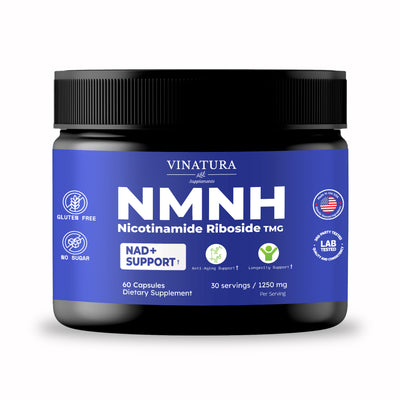
What Foods Are High In NMN? 13 Natural Sources for You
NMN, or Nicotinamide mononucleotide, has recently gained significant attention for its role in supporting cellular health, helping you stay youthful, and potentially increasing lifespan. As a precursor to NAD+ (nicotinamide adenine dinucleotide), NMN plays a crucial role in energy production, DNA repair, and overall metabolic function. To understand more about this compound and discover the foods rich in NMN, let's dive into the following article!
Before exploring further, please read the disclaimer located at the end of this webpage.
Key Takeaways
- NMN is essential for cellular energy and anti-aging.
- Incorporating NMN-rich foods into your diet can help maintain optimal NAD+ levels.
- Knowing which foods are high in NMN can help you choose a better diet.
- NMN can be found in both plants (vegetables, fruits...) and animals (meat, shrimp...).
The Importance of NMN in the Human Body

NMN is necessary for the production of NAD+, a coenzyme involved in many critical biological processes. NAD+ helps convert nutrients into energy, repair damaged DNA, and regulate circadian rhythms. As we age, natural NAD+ levels decline, leading to reduced energy levels, cognitive decline, and increased risk of age-related diseases [1]. Therefore, supplementing NMN through nutrient-rich foods supports the natural production of NAD+ in the body, promoting health and longevity.
Why Should You Need to Increase NMN Levels?
Increasing NMN levels offers numerous health benefits, including improved metabolism, enhanced brain function, and increased energy levels. Supplementing NMN is also linked to better cardiovascular health, reduced inflammation, and slower aging [2]. Given its role in maintaining NAD+ levels, ensuring adequate NMN intake becomes crucial, especially as we age.
What Foods Are High In NMN?

Broccoli
Broccoli is a nutrient-rich vegetable that not only contains numerous vitamins and minerals but also a significant amount of NMN. With approximately 0.25-1.12 mg of NMN per gram, broccoli supports cellular health and overall energy production. It also contains many antioxidants that help reduce overall stress. There are many ways to prepare broccoli to integrate it into a variety of dishes; you can steam, stir-fry, or add broccoli to salads and smoothies.
Cabbage
Cabbage, especially red or purple cabbage, contains a relatively high amount of NMN and is rich in fiber and vitamin C, which are beneficial for immunity and digestion. You can ferment it to make sauerkraut. This preparation method not only retains the nutrients but also adds beneficial probiotics that enhance digestive health.
Tomatoes
Tomatoes, a familiar ingredient for most of us, are also a food rich in NMN, containing about 0.26 mg of NMN per gram on average. They are a rich source of lycopene, an antioxidant that effectively improves cardiovascular health in adults [3]. Tomatoes can be eaten raw, made into salads, combined with other dishes, or even cooked into soups, making them versatile and convenient.
Avocado
Avocado, a fruit rich in natural fats, contains 0.5 - 0.7 mg of NMN per gram. Avocados are not only delicious but also promote skin and hair health, provide energy, and are packed with antioxidants. Avocados can be prepared in various ways, mainly in salads or smoothies, enhancing their flavor and making them a versatile ingredient.
Edamame (Japanese soybeans)
Edamame, a type of fermented soybean from Japan, is very rich in NMN. However, this does not mean you can only find it in Japan. You can prepare this dish yourself using simple ingredients and Japanese cooking methods, making it a unique addition to your NMN-rich diet.
Cucumber
Like tomatoes, cucumbers are a familiar vegetable that can be found in salads, juices, stews, stir-fries, or even fermented into pickles with beneficial probiotics for gut health. Few people know that cucumbers are also rich in NMN, making them an affordable and accessible source of NMN.
Mushrooms
Mushrooms, in general, are NMN-rich foods, but the most abundant NMN content can be found in shiitake mushrooms or white button mushrooms. They are rich in NMN as well as omega-3, which is good for cardiovascular health. Mushrooms can be used as a supplementary ingredient in soups, stir-fries, and stews, or eaten on their own when well-prepared.
Beef
Beef is a strong source of NMN, especially in lean cuts. It also provides high-quality protein and essential vitamins like B12. Choose naturally raised beef for a healthier option and enjoy it grilled, roasted, or cooked in stews to bring out the delicious flavor and abundant NMN content.
Shrimps
Shrimps, a nutrient-rich crustacean from the ocean, are also high in NMN. Shrimp are not only rich in vitamins and minerals but also provide a significant amount of NMN, serving as a low-fat protein source for humans. Surely, you already have some delicious shrimp dish ideas in mind for tonight's menu, right?

Peanuts
Peanuts are a convenient snack that provides NMN along with healthy fats and protein. They also offer resveratrol, a compound known for its anti-aging effects. Enjoy peanuts raw, roasted, or as peanut butter spread on toast or added to smoothies for a great NMN boost.
Spinach
Spinach is another nutrient-rich vegetable that not only contains iron, and calcium... but also serves as a highly effective "green" source of NMN. To get the most NMN, you should prepare it in soups, salads, or smoothies to retain the vegetable's nutrients.
Grapes
Grapes, especially red and black varieties, are rich sources of NMN and highly nutritious. Not only delicious, but grapes also contain a significant amount of resveratrol, a nutrient that improves cardiovascular health as mentioned earlier. Grapes are best eaten raw, though they can be juiced, but this may reduce the fiber content.
Apples
The final fruit and "member" on this list is apples, which are also rich in NMN. In addition to NMN, apples provide vitamin C and fiber, offering many other health benefits. You can eat apples raw, bake a sweet apple pie, make a juice, or add apple cider vinegar to your dishes to supplement NMN.
What Food Has the Highest NMN Level?
Among the foods listed, edamame, broccoli, and avocados are some of the richest sources of NMN. However, the exact NMN content can vary depending on factors such as the cultivation and processing methods of each food. Regardless, if you're not allergic to any of these foods, why not try incorporating them all into your diet to create a diverse menu? Not a bad option, right?
Ways to Supplement NMN
Besides including NMN-rich foods in your diet, there are many other ways to supplement NMN. For example, NMN supplementation through supplements is also an effective and optimal method. You can fully control the amount of NMN you intake thanks to the pre-measured dosages.
What is the Best Way to Supplement NMN?
In reality, the exact answer to this question will depend on your usage needs. The best method will be the one that provides optimal effectiveness and convenience during your use.
However, if possible, supplement NMN in all the ways you can! Adding it to your diet? Using supplements? Why not both?
How to Maximize NMN Absorption from Foods?
To maximize NMN absorption from foods, ensure that the food sources you choose are grown and harvested using the best quality methods. Additionally, make sure that your cooking methods will help retain as much NMN in the food as possible without causing it to be lost or destroyed during cooking!
Supplements Vs Diet: Which is Better to Absorpt NMN?
When comparing supplements with diet, choosing between the two methods depends on your health goals and individual needs. Supplements provide NMN in precise dosages and are often absorbed faster, but a balanced diet with NMN-rich foods offers more comprehensive benefits, including other nutrients that support overall health. Both methods have their advantages and can be combined for optimal results.
Conclusion
Incorporating NMN-rich foods into your diet can help maintain NAD+ levels and support cellular health and longevity. Foods like broccoli, cabbage, and avocados not only provide NMN but also offer many other essential nutrients. By balancing NMN-rich food consumption with supplements, you can optimize your health benefits. Remember, a balanced diet and healthy lifestyle are key to maintaining good health and effectively combating aging.
References
- [1] Verdin, Eric. “NAD + in Aging, Metabolism, and Neurodegeneration.” Science, vol. 350, no. 6265, Dec. 2015, pp. 1208–13. https://doi.org/10.1126/science.aac4854.
- [2] Uddin, Golam M., et al. “Head Head Comparison of Short-Term Treatment With the NAD+ Precursor Nicotinamide Mononucleotide (NMN) and 6 Weeks of Exercise in Obese Female Mice.” Frontiers in Pharmacology, vol. 7, Aug. 2016, https://doi.org/10.3389/fphar.2016.00258.
- [3] Shi, John, and Marc Le Maguer. “Lycopene in Tomatoes: Chemical and Physical Properties Affected by Food Processing.” Critical Reviews in Food Science and Nutrition, vol. 40, no. 1, Jan. 2000, pp. 1–42. https://doi.org/10.1080/10408690091189275.
Author

Product Disclaimer
The dietary supplement products mentioned on this website are formulated based on scientific research and adhere to FDA guidelines for dietary supplements. However, the content of the articles has not been evaluated by the Food and Drug Administration (FDA) and is not intended to promote or endorse any specific product. Any products sold on this website are not intended to diagnose, treat, cure, or prevent any disease.
Opinions and Endorsements
Any claims, statements, or opinions expressed in the articles are those of the author(s) and do not necessarily reflect the views or opinions of the manufacturers of the dietary supplement products. The products sold on this website are separate from the content of the articles and are not directly endorsed or associated with the information presented here.
Liability Disclaimer
The author(s) of the articles, website, and manufacturers of the dietary supplement products do not assume any liability for any potential consequences arising from the use of the information provided in the articles. It is recommended that individuals consult with a qualified healthcare professional before making any dietary or lifestyle changes, including the use of dietary supplements.
Product Usage
Please refer to the product labels and packaging for specific usage instructions and guidelines for the dietary supplement products sold on this website.
Customer Support
For any concerns or questions regarding the dietary supplement products, please contact our customer support team, who will be more than happy to assist you.





Leave a Comment
Be the first to comment.
What do you think?